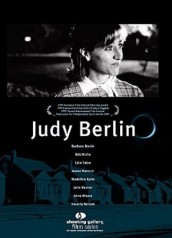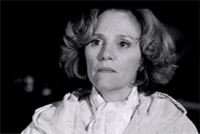|
Judy Berlin
|
| |
 |
USA, 1999. Not rated. 93 minutes.
Cast:
Edie Falco, Madeline Kahn, Aaron Harnick, Barbara Barrie, Bob Dishy, Julie
Kavner, Carlin Glynn, Bette Henritze
Writer: Eric Mendelsohn
Music: Michael Nicholas
Cinematographer: Jeffrey Seckendorf
Producer: Rocco Caruso
Director: Eric Mendelsohn
LINKS
|
Note: This analyzes the conclusion of the film and
contains spoilers.
 riter/director
Eric Mendelsohn's feature debut, the black-and-white Judy Berlin, is
a slice-of-life drama that follows the activities of a handful of characters
over the span of a single day in Long Island. The story remains slightly out
of focus until the final scene, like you're watching it through a fuzzy lens
that is suddenly wiped clean. With the wistful exchange between Judy Berlin
(Edie Falco) and David Gold (Aaron Harnick) as they bid each other farewell
on the platform of the Babylon train station, Mendelsohn's motifs converge,
and his intent becomes crystal clear.
riter/director
Eric Mendelsohn's feature debut, the black-and-white Judy Berlin, is
a slice-of-life drama that follows the activities of a handful of characters
over the span of a single day in Long Island. The story remains slightly out
of focus until the final scene, like you're watching it through a fuzzy lens
that is suddenly wiped clean. With the wistful exchange between Judy Berlin
(Edie Falco) and David Gold (Aaron Harnick) as they bid each other farewell
on the platform of the Babylon train station, Mendelsohn's motifs converge,
and his intent becomes crystal clear.
One-time high-school classmates that recognize each other in the street more
than ten years later, Judy and David spend most of the day together, chatting
and strolling about town while trying to decide what to do about the attraction
pulling them to one another. Vivacious Judy has large dreams, about to leave
for Hollywood to pursue her acting career, even though she has only appeared
in cheap local commercials and makes ends meet "recreating" colonial life in
period dress at a local tourist attraction. The corrective braces on her teeth
("Haven't you ever seen adult braces before?") punctuate Judy's childlike optimism.
She is the sort of person determined always to see the best in anyone she meets.
In contrast, David is a constricted bundle of negative energy, loafing around
his parents' home with no intention or interest in pursuing a job. Perhaps because
he so lacks it himself, he is irrestibly drawn to the positivity in Judy, even
though he tries not to be recognized when they first meet. She mistakes him
for a filmmaker, thinking he has returned home to scout locations for a movie.
Though David doesn't actively feed her assumption, he does not contradict it,
either. Judy excitedly speculates about making a film together one day.
Gradually, imperceptibly, Judy's optimism rubs off on David. At one point he
talks about how he's like to make a documentary--a unvarnished, unembellished
documentary that captures the simple beauty of their town… how the light reflects
off certain windows, for example. Later, uncomfortable on some level with Judy's
effect on him, and jealous that she's about to leave town, David can't resist
pissing all over her California dreams. She leaves for the train station; he
rushes there to apologize.
On a parallel track, the film follows Judy and David's parents. Housewife Alice
(Madeline Kahn, perfectly cast, in her last screen role) is a bit loopy. She
loves life, but has odd ways of expressing it. She still sees her husband, Arthur
(Bob Dishy), as her knight in shining armor, and she playfully insists that
he participate in her romantic games, compelling him to utter sweet nothings
that he doesn't mean anymore. He can't wait to get out of the house to go to
go to the local elementary school, where he is the principal, even though that
job offers plenty irritants of its own. One of them is Judy's mother, Sue (Barbara
Barrie, moonlighting from her regular job of playing the star's mother as a
recurring character on half the sitcoms made in the last twenty years). She
harbors an unrequited desire for Arthur, and quickly demonstrates her obliviousness
to everything else when she busts into a tedious conversation about schoolbus
color codes to talk to Arthur. Sue learns her lessons, however, when she gets
slapped and lectured on selfishness by suddenly lucid (normally senile) former
schoolteacher Dolores Engler (Bette Henritze), who wanders into Sue's classroom,
formerly her own. Later in the day, Sue has another revelation when Arthur finally
kisses her and it turns out to do not much for her. They part, and Sue rushes
off in a futile effort to catch Judy before she leaves.
Arthur is a confused man. He discovers that he is attracted to Sue when he
tries to comfort her after Dolores' intrusion. He has no idea what to do about
it. He drives home, sits in his car, and then careens off to the school again
while Alice watches in shock from across the street, finally comprehending that
something in her marriage is wrong. At the school, Arthur approaches Sue and
comically repeats again and again that--he wants to be absolutely clear
about this--he has no idea what he is doing, before finally kissing her.
Meanwhile, Alice follows Arthur's car on foot, encountering Arthur as he again
leaves the school. They stare wordlessly at one another, both aware for the
first time that an emotional reconnection is needed.
The last scene, between David and Judy at the Babylon train station, is the
lynchpin of the film. David expresses disappointment at not having more time
with Judy. They've had only a brief moment together, and once she's gone, that
moment will be lost. Judy disagrees. "Not if you make a movie about it," she
declares brightly. In that uncomplicated suggestion lies the raison d'ętre
of the film. Judy's words and David's earlier words about making a documentary
are Mendelsohn's statement of artistic purpose.
Judy Berlin isn't just a slice-of-life movie; it's the quintessential
slice-of-life movie--a movie whose primary purpose is to capture a moment in
time and contectualize it. Committed to film, the moment is not lost, but forever
immemorialized. This intent is unmistakably symbolized by the film's chief motif,
that of a solar eclipse without end. It begins at midday, and continues all
afternoon, getting darker and darker, merging into night. Like the eclipse,
which is supposed to last only a few minutes, the brief period David and Judy
are together will also continue timelessly and indefinitely, thanks to the movie.
No doubt a timeless mood is no doubt what Mendelsohn was shooting for when he
chose to shoot in black and white. (Unfortunately, Mendelsohn and cinematographer
Jeffrey Seckendorf seem not to have cared or paid much attention to how colors
look in black and white. They don't seem sensitive to the fact that some colors
look nearly identical, nor do they take advantage of the heightened contrasts
and opportunities to play with light and shadow offered by the format.)
One strongly suspects that the fleeting moments captured in Judy Berlin
come from the filmmaker's own life, who, one suspects just as strongly, is represented
in the film by David Gold. David now sees himself as Judy sees him--as a maker
of movies, as someone who can make his own dreams happen and not just moulder
away, his potential unrealized. It is likely no accident that Judy Berlin
is Mendelsohn's feature debut; there must be a Judy Berlin in his own life that
has inspired him. Yet for Judy and David's parents, who have not lived the lives
they expected, dreams are not real, but fantasies hiding a quiet despair. Perhaps
the point is that dreams not followed passionately become only illusions. Like
Judy and David, one must act to make one's dreams reals.
Analysis
© September 2002 by AboutFilm.Com and the author.
Images © 1999 Shooting Gallery Films. All Rights Reserved.



